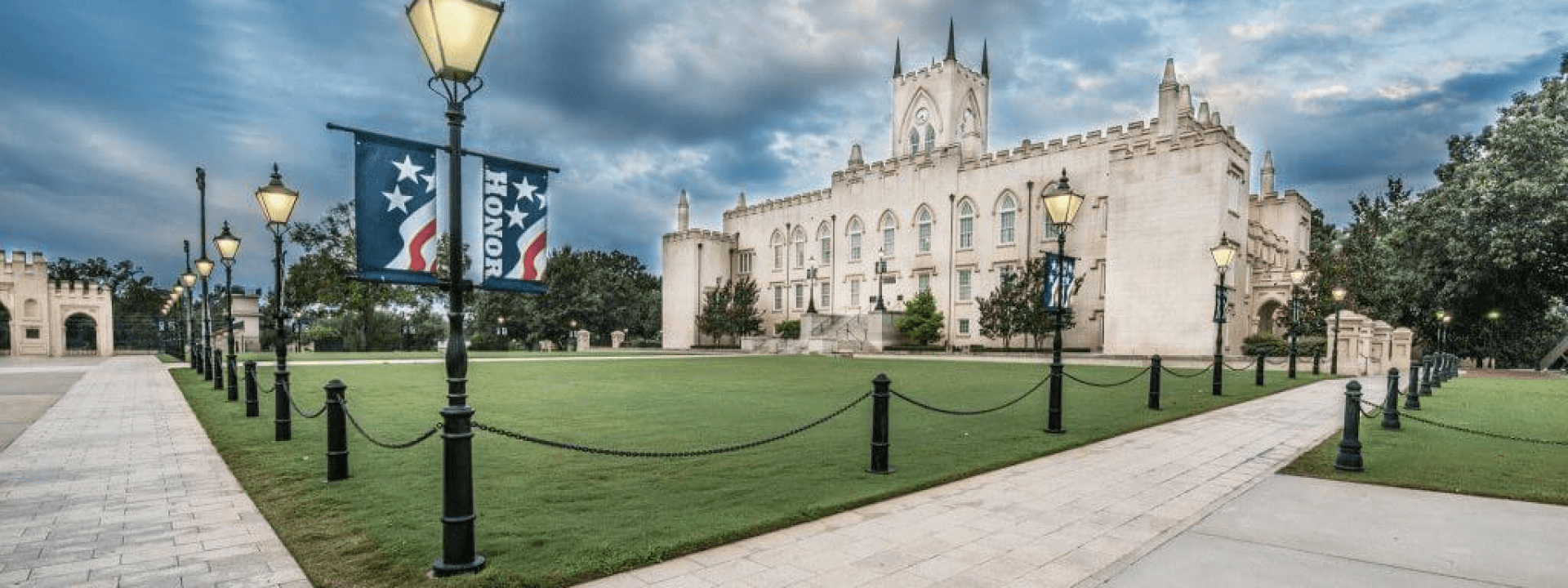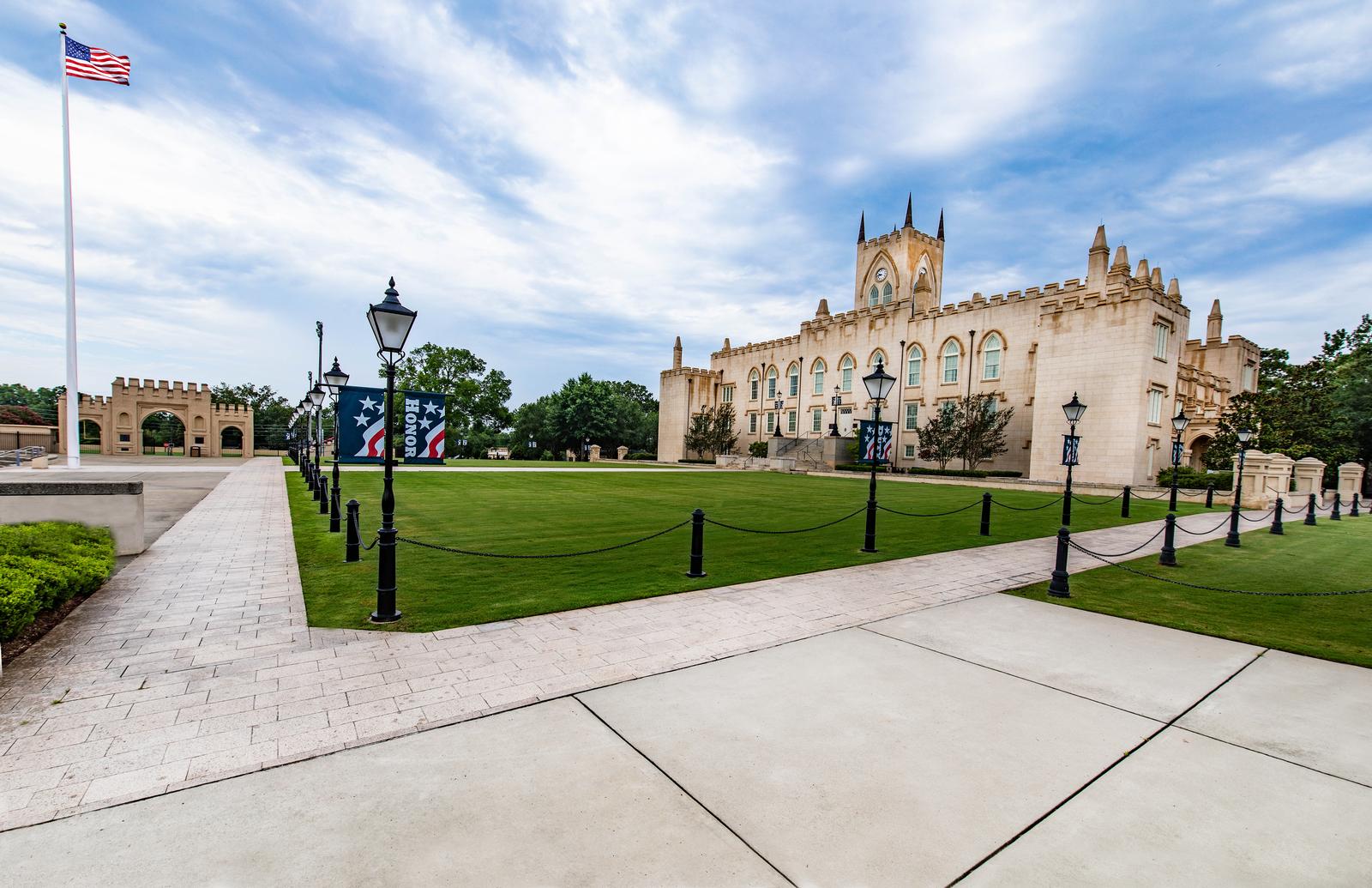Georgia Military Institute - In addition to serving students from a wide range of Georgia cities and towns, the campus also serves as the community college of choice for Baldwin County and its five border counties. The main campus is also home to nationally renowned cadets.
Parking: The Atrium on South Albert Street is indicated on our campus map and labeled #4. You are welcome to park in any GMC lot, but we recommend parking near the Kid Center (#19), these are usually the most available.
Georgia Military Institute
 Source: bloximages.chicago2.vip.townnews.com
Source: bloximages.chicago2.vip.townnews.com
Please note: You will need a parking pass to park on campus. Download and print your parking pass by clicking here. NATO integration and military cooperation with the United States are two of the main driving forces behind Georgia's military reforms and hopes to counter Russian aggression.
Do College Your Way
There is broad consensus in Georgian society on the need to advance NATO membership through a full commitment to compatibility and interoperability with NATO's Standard Operating Procedures. Although the NATO Partnership for Peace program launched in 1994 provided Georgia with a new platform to improve its relations with the West, the weakness of Georgian state institutions at the time meant that even early NATO-Georgia cooperation
was weak. [I] . Against this background, military subordination to civilian leadership was only enforced until the turn of the millennium, and Georgia was able to upgrade its relations with NATO with improved civil-military relations. Georgia's participation in international peacekeeping operations began in 1999 with the deployment of the first 34 peacekeepers to NATO's Kosovo Mission (KFOR).
After improving the state of the defense force and increasing political interest in contributing to international security, Georgia increased its contribution to KFOR to a total of 2,225 military personnel. Photo by Major William Carraway Georgia Military Institute officer's newly commissioned second lieutenant ... Read More Georgia first announced its bid for NATO membership in 2002, increasing US interest in the country.
After the September 11 attacks, Georgia joined the Global War on Terrorism and in 2002, the United States launched the Georgia Train and Equip Program (GTEP) to protect Georgian security forces from internal terrorist threats in the Pankisi Gorge.
Do College Your Way
helped by Later, GTEP became the basis for the Georgian Sustainment and Stability Operations Program (GSSOP), which trained Georgian forces for US-led peace support operations in Iraq and the United States. Enabled the contribution of 2,300 Georgian troops to coalition forces led by the United States European Command played a key role in reviewing the Georgian Defense Forces following the 2008 Russo-Georgia War.
This assessment became the basis for US-Georgia strategic bilateral cooperation, which later defined the construction, development, and reform of Georgia's defense establishment. of military education. The United States helped complete the Strategic Defense Review (2010-2014) as well as publish a new 2014 National Military Strategy to better reflect the security environment.
 Source: app.streamlineathletes.com
Source: app.streamlineathletes.com
For more than a century, GMC's Corps of Cadets has been dedicated to sharpening the intellect, elevating character and enhancing the strengths of our students. Our students are encouraged to ask questions and are challenged to find solutions, recognizing their leadership skills and critical thinking as they explore a world of possibilities.
The New Georgia Encyclopedia does not own the copyright to this media resource and does not grant permission to reproduce or republish the image online or in print. All requests for permission to publish or reproduce a resource must be submitted to the copyright holder.
GMI's existence was threatened in 1861, when Georgia seceded from the Union and Governor Joseph E. Brown asked GMI Superintendent Francis W. Keepers was asked to provide drill instructors for new Georgia volunteers at flood training camps in the state.
Other GMI cadets left in 1861 and 1862 to serve in the newly formed Southern armies. The school survived by enrolling more students, but the federal government's Conscription Act of April 1862 left cadets vulnerable to the draft, again threatening GMI's survival.
Brown intervened on GMI's behalf and secured the institution by making it the home of the state's Corps of Engineers. Brown appointed Capers Chief Engineer of Georgia with the military rank of Major. During the late summer and fall of 1864, Brown reassigned the GMI cadets to defend the state capital at Milledgeville from Union cavalry raids.
In mid-November 1864, the cadets left Milledgeville as part of a ragtag group of militia and charged in hopes of stopping Sherman's march to the sea. Despite their efforts, Savannah fell in December, and the GMI battalion spent the remainder of the war as guards at Milledgeville and Augusta.
The battalion was officially disbanded on 20 May 1865. The Georgia Military Institute was established in Marietta in 1851 to train new engineers and teachers for the state. Many GMI students were called to active duty during the Civil War, and in 1864 Union troops burned down the school.
It never reopened. Captain D.R. of the 20th Connecticut. Brown Sketches Whether you are a first-year student or transfer student, resident cadet, athlete or international student, we look forward to helping you begin your journey at GMC-Milledgeville.
 Source: wgxa.tv
Source: wgxa.tv
New Student Orientation programming is designed to help all new students transition to campus. After the dissolution of the Soviet Union, an independent Georgia found itself challenged by Russian Federation-backed separatist movements in the regions of Abkhazia and Tskhinvali, leading to civil war in the early 1990s.
Since then, Russia has acted as a major destructive actor in the development of Georgia and its state, such as the 2008 Russo-Georgian War and 20 percent of Georgian territory still under Russian occupation. Georgia Military College's dining facility, located in Boylan Hall, is always open during the academic term.
Breakfast, lunch and dinner are served during the week, brunch and dinner are served on weekends/holidays. Meal times are adjusted during breaks and school closures. Meals usually include a choice of entrees with a choice of vegetables.
A variety of small order items are also available during lunch and dinner, as well as the salad bar and deli bar. Fresh soups and desserts are available daily. Georgia's bid to become a NATO member state has coincided with Russia's condemnation of NATO's eastward expansion.
Therefore, every new method of NATO-Georgia cooperation, including participation in joint military exercises, is subject to careful consideration by the Russian element. Although experience gained through multilateral programs benefits Georgia's national defense capabilities, regional defense is outside of NATO's aid priorities.
Against this backdrop, US support is critical in improving Georgia's regional defense capabilities[ii]. After the war, GMI alumni and keepers made several attempts to reopen the school, but all efforts failed to secure sufficient financial support from the state.
The Georgia legislature instead used limited funds available during Reconstruction on public education in civilian schools. Conflicts in the regions of Abkhazia and Tskhinvali have significantly hindered the process of building an independent Georgian state. Georgia's security and defense institutions were established in the early 1990s amid a power struggle between independent paramilitary units and the civilian government.
Founded in Marietta and opened to students in July 1851, the Georgia Military Institute (GMI) was the largest source of education for new engineers and teachers in the state during the decade before the Civil War (1861–65).
 Source: www.gmc.edu
Source: www.gmc.edu
. Originally financed by private subscriptions and donations, GMI began its official relationship with the state in 1852, when the legislature chartered the school and equipped it with guns, swords, and a battery of four guns.
Although GMI began with only three instructors and seven students, it soon attracted a large number of cadets from Georgia's wealthiest families. Between 1853 and 1861, GMI's student body fluctuated between 150 and 200 cadets. Francis W.
At the beginning of the Civil War, Superintendent Capers of the Georgia Military Institute in Marietta provided drill instructors from among the school's cadets to train new Confederate soldiers. In May 1864 he led his cadets as a volunteer unit in the Confederate army and attempted to stop the advance of Union troops in Georgia.
During nearly three decades of independence, Georgia has gradually expanded its geopolitical horizons. Georgia has a 360-degree view of the security environment and nature of threats. Tbilisi identifies itself as a Black Sea and Southeast European state that plays a role in connecting East and West.
The United States views Georgia as a key actor in the transatlantic security architecture, as demonstrated by the 2009 United States-Georgia Charter on Strategic Partnership, the 2016 Memorandum on Security in Depth and Military Cooperation, and the three-year Georgia Defense Readiness Agreement.
The program is carried out by 2099. In 201007 For more than a century, GMC's Corps of Cadets has been dedicated to sharpening the intellect, elevating character and enhancing the strengths of our students. Our students are encouraged to ask questions and are challenged to find solutions, recognizing their leadership skills and critical thinking as they explore a world of possibilities.
The New Georgia Encyclopedia does not own the copyright to this media resource and does not grant permission to reproduce or republish the image online or in print. Requests for permission to publish or reproduce a source should be submitted to Georgia Archives.
The frozen conflict in the regions of Abkhazia and Tskhinvali, and the defense of Georgia's territorial integrity against an aggressive Russia, are the main responsibilities of the Georgian Defense Forces. Georgia's desire to become a NATO member state is at the forefront of Georgia's foreign and security policy.
 Source: i.ytimg.com
Source: i.ytimg.com
NATO membership gives Georgia incentives to deter Russia as well as integrate into the Transatlantic Community. US bilateral military cooperation with Georgia and ongoing support for the NATO integration process not only improves the capabilities of Georgia's defense forces, but also reaffirms US commitment to peace and stability in the Black Sea region.
Thus, Georgia's participation in NATO's multilateral programs, including its participation in international missions, represents an extension of the defense of national security interests. Sometime during the 1850s the state legislature began subsidizing the education of ten cadets annually as a way to provide qualified engineers and teachers for state projects.
After graduation, these cadets were required to serve the state for two years. GMC's main campus shares Lake Sinclair and the historic town of Milledgeville with Georgia College and State University. The main campus offers a traditional college experience where students live away from home in College Town, a stunning 150-acre campus with paved walking trails, a fitness center, off-campus study opportunities, athletics, fine arts and more.
There's a lot. Takes all classes. Clubs and intramural activities. Although cadet battalions spent most of the Civil War serving as funeral details, provost guards, prisoner guards, and drill instructors, in the spring of 1864 Union General William T.
The arrival of Sherman's troops forced the Georgia authorities to reassign every available man to active defense. Desiring to have the state's own cadets enter service as a volunteer unit rather than subject to the draft, Capers mustered them into the regular Confederate army in May.
As Sherman's army arrived in Dalton, GMI cadets were assigned to active duty in the Confederate Army of Tennessee. Although Sherman's troops burned the GMI buildings in Marietta, the Cadet Battalion entered active service against Union troops and fought off Union attacks along the Chattahoochee River in July and during the Siege of Atlanta in August.
Photo by Major William Carraway Newly commissioned 2nd Lt. of Georgia Military Institute Officer Candidate School Class 61 with Brig. Gen. John Gentry, commander of the 78th Troop Command, following a commissioning ceremony Aug. 13, 2022, at Clay National Guard Center, Marietta, Ga.
See less See image page Meanwhile, Georgia's contribution to international missions has increased in terms of quality and quantity through its participation in the International Security Assistance Force (ISAF) in Afghanistan. Despite the recall of Georgian international peacekeepers to serve in the Russo-Georgian war, Georgia remained committed to its international obligations.
 Source: c8.alamy.com
Source: c8.alamy.com
In 2009, Georgia renewed its support for the NATO mission in Afghanistan with an initial deployment of 173 troops, which rose to 749 troops in 2010 and 1,571 troops in 2012. Since 2004, Georgia has deployed more than 20,000 troops.
The NATO-led Resolute Support Mission (RSM), is becoming a major non-member contributor. Participation in international missions has also broadened the scope of civil-military relations in Georgia. By joining these peacekeeping missions, Georgia has presented itself as a responsible international actor.
Located in Milledgeville, about 93 miles southeast of Atlanta, Georgia Military College (GMC) was founded in 1879 to educate young men from middle Georgia in an environment that fostered good citizenship. In 1950, the US War Department designated GMC as one of five military junior colleges in the United States.
Georgia Military College campus police officers are on duty 24 hours a day, including weekends and holidays. A campus police officer can be contacted by calling 478-387-4717. If no one is in the office the Milledgeville Police Department will answer the dispatch phone and a G.M.C.
Officer you. Jonathan L.D. Lamar, a cadet at the Georgia Military Institute in Marietta, poses in his uniform for a tintype made around 1856. During this time the school enrolled 150 to 200 cadets, many of whom came from Georgia's wealthiest families.
The New Georgia Encyclopedia does not own the copyright for this media resource and may not grant or deny permission to reproduce or republish the image online or in print. All requests for permission to publish or reproduce a resource must be submitted to the copyright holder.
The Middle East Institute (MEI) is an independent, non-partisan, non-profit, educational organization. It does not engage in advocacy and the views of its scholars are their own. MEI welcomes financial donations, but maintains editorial control over its work and its publications reflect only the views of the authors.
For a list of MEI donors, please click here. US bilateral cooperation with Georgia has not only contributed to capacity building within the Georgian Defense Forces, it has also had a profound impact on Georgia's understanding of its own role in the regional security context.
For more than two decades, successive governments of Georgia have prioritized Euro-Atlantic integration as the main pillar of Georgia's foreign policy. This is an important way for Georgia to position itself as a strategic partner of the transatlantic alliance, promising enhanced cooperation and enhanced interoperability.
According to the First Deputy Chief of Defense Forces of Georgia, Major General Nikoloz Zanjagawa, by standing with the US and NATO countries where they need it most, Georgia is "a household name" rather than a foreign country for a NATO member.
Aspires to be- State.”[iii]
georgia military college, georgia military academy history, georgia military institute 1861, north georgia military institute, georgia military academy, georgia military college milledgeville, georgia military college atlanta, free military school in ga